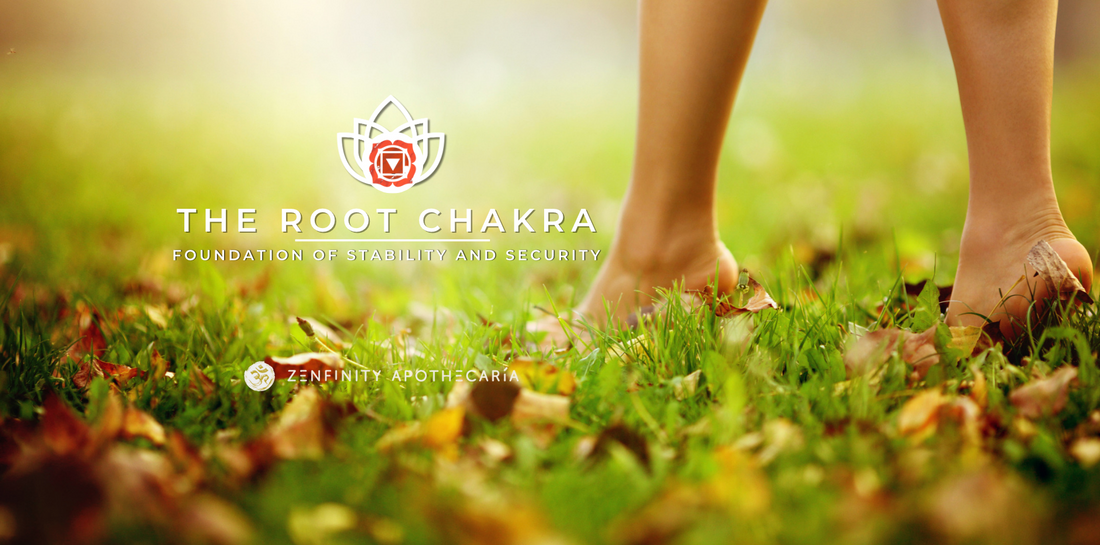The concept of chakras originates from ancient Eastern traditions, particularly within the practice of yoga and Ayurveda. These energy centers are believed to govern different aspects of our physical, emotional, and spiritual well-being. The Root Chakra, also known as Muladhara, is the first of the seven main chakras and plays a crucial role in grounding, stability, and security.
In this article, we’ll explore the Root Chakra’s significance, its role in our overall well-being, and how herbs and essential oils, in addition to traditional balancing practices, can help activate and heal this energy center for greater emotional and physical health.
What is the Root Chakra?
The Root Chakra is the energy center located at the base of the spine, at the perineum (the area between the anus and the genitals). It is often symbolized by a red color and is represented by a four-petaled lotus. This chakra is associated with the earth element, grounding, and survival. It is the foundation of our energy system and is considered the "root" because it connects us to the Earth and provides the stability and support needed for growth in the other chakras.
In terms of physical anatomy, the Root Chakra is linked to the lower body—particularly the legs, feet, spine, and the organs of elimination such as the colon, kidneys, and bladder. It is also associated with the adrenal glands, which are responsible for the body's fight-or-flight response.
The Role of the Root Chakra in Our Lives
The Root Chakra governs our sense of stability, security, and survival. It is the energy center that influences how we relate to the physical world and our place within it. When this chakra is balanced and open, we feel rooted in our lives, secure in ourselves, and able to navigate challenges with resilience.
Key aspects governed by the Root Chakra include:
-
Safety and Security
The Root Chakra is the center of our survival instincts and is tied to our feelings of safety and security. It influences our basic needs such as food, shelter, and financial stability. When the Root Chakra is balanced, we feel secure in our environment and trust that our needs will be met. Conversely, when it is out of balance, we may experience anxiety, fear, or a sense of instability in our lives. -
Grounding and Stability
This chakra connects us to the Earth, providing the grounding and stability we need to stand firm in life. A balanced Root Chakra allows us to feel supported by the world around us, giving us the strength to take action and make decisions with confidence. It is the foundation upon which we can build the higher chakras, fostering a sense of structure and resilience. -
Survival and Self-Preservation
As the first chakra, Muladhara is connected to our basic survival instincts. It influences how we respond to danger, how we protect ourselves, and how we manage life’s challenges. A strong Root Chakra gives us the ability to stand our ground and navigate difficulties with a sense of inner strength. -
Connection to the Physical Body
The Root Chakra is also about our connection to the physical body and the present moment. It encourages us to be grounded in our physical reality and embrace the here and now. A well-balanced Root Chakra promotes vitality and a healthy sense of embodiment, making us more aware of our physical health and well-being.
Symptoms of an Imbalanced Root Chakra
When the Root Chakra is imbalanced or blocked, it can manifest in a variety of physical, emotional, and mental symptoms. These can include:
Physical Symptoms:
- Lower back pain or issues with the spine
- Knee or leg problems or a sense of instability when walking
- Fatigue or a lack of vitality
- Digestive issues, particularly constipation or problems with the colon
- Weak immune system or frequent illness
- Chronic stress or tension in the body
Emotional and Mental Symptoms:
- Anxiety, fear, or panic attacks, especially related to financial or personal security
- Feeling ungrounded or disconnected from reality
- Lack of confidence or a sense of instability in life
- Depression, especially related to feelings of disempowerment or insecurity
- Difficulty with commitment or establishing long-term relationships
Behavioral Symptoms:
- Procrastination or difficulty following through on tasks
- Excessive worry about survival or safety
- Isolation or withdrawal from others
- Obsessive behaviors around material security or control
How to Balance the Root Chakra
Balancing the Root Chakra involves practices that ground you, restore your sense of security, and reconnect you with your physical body and the Earth. In addition to grounding exercises and mindful practices, herbs and essential oils can serve as powerful tools in restoring balance to the Root Chakra. Here are some ways to activate, balance, and heal the Root Chakra:
1. Grounding Practices
The most direct way to balance the Root Chakra is through grounding exercises that connect you to the Earth. Some grounding practices include:
- Walking barefoot on natural surfaces like grass, dirt, or sand. This helps you reconnect with the Earth’s energy and promotes physical grounding.
- Tree pose (Vrksasana) in yoga, which involves standing on one leg and finding balance. This posture can help you feel more stable and centered.
- Earthing, or "grounding," refers to practices that involve direct contact with the Earth’s natural energy, such as sitting or lying on the ground.
2. Herbs for the Root Chakra
Herbs have been used for centuries to help balance the body’s energy systems. For the Root Chakra, herbs that support grounding, strength, and stability are most beneficial. Some of the best herbs to balance and nourish the Root Chakra include:
- Ashwagandha: An adaptogenic herb known for its ability to help the body manage stress and restore energy levels. It’s particularly useful for enhancing feelings of security and grounding.
- Ginger: A warming herb that stimulates circulation and provides an energizing, grounding effect. It’s great for restoring vitality and boosting the body’s connection to the Earth.
- Horsetail: A herb rich in minerals that helps strengthen the bones and connective tissues, fostering physical stability.
- Rosemary: Known for its invigorating properties, rosemary can help clear stagnant energy and promote clarity and mental focus.
- Tulsi (Holy Basil): Often used in Ayurvedic medicine, Tulsi supports physical vitality and helps calm the mind, making it a great herb for restoring balance to the Root Chakra.
These herbs can be consumed as teas, tinctures, or in capsule form. To best integrate them into your practice, try a soothing tea with ginger, ashwagandha, and tulsi, or diffuse rosemary essential oil during meditation.
3. Essential Oils for the Root Chakra
Essential oils can be highly effective in rebalancing the Root Chakra. The right essential oils help calm the nervous system, promote stability, and connect you with the Earth’s energy. Here are some essential oils that support the Root Chakra:
- Vetiver: Often referred to as the “oil of tranquility,” vetiver is deeply grounding and calming. Its earthy, rich aroma helps to stabilize the emotions and promote a sense of security.
- Sandalwood: Known for its ability to promote inner peace and clarity, sandalwood has a deep, grounding quality that enhances meditation and spiritual connection. It is especially beneficial when you need to center yourself and feel more anchored.
- Patchouli: With its rich, earthy scent, patchouli is often used to ground the body and mind. It helps reconnect you to the present moment and strengthens your sense of stability.
- Cedarwood: Cedarwood essential oil is grounding and soothing, with a woody, earthy aroma that promotes feelings of safety and security. It is particularly effective in helping you feel connected to the Earth and your physical body.
- Frankincense: This sacred oil is often used to promote spiritual awareness and grounding. Frankincense helps calm the mind and connect you to the Earth’s energy.
To use these oils, diffuse them in your home, add a few drops to a bath, or mix with a carrier oil for a grounding massage on your feet, spine, or lower back. A few drops of patchouli or sandalwood applied to the soles of your feet before bedtime can help promote deep relaxation and a sense of stability. You'll find these oils and more in our Root Chakra balancing candle: Muladhara Organic Lotion Candle
4. Physical Exercise
Engaging in physical activity, particularly exercises that focus on the lower body, helps to strengthen the Root Chakra. Practices such as walking, hiking, dancing, or yoga (particularly poses like Warrior I, Chair Pose, or Downward Dog) help to activate and balance the Root Chakra. These activities not only support physical health but also foster a deeper connection to the body.
5. Affirmations and Mantras
Positive affirmations are a powerful way to reprogram the mind and restore confidence. Root Chakra affirmations focus on feelings of safety, security, and stability. Examples include:
- “I am grounded, stable, and secure.”
- “I trust the process of life.”
- “I am supported by the Earth beneath me.”
- “I am safe and secure in my body.”
You can also chant the mantra “LAM,” which is the seed sound (bija mantra) of the Root Chakra. Chanting this sound during meditation or while practicing yoga can activate the energy of the Root Chakra and help you feel more centered.
The Root Chakra, or Muladhara, is the foundation of our energetic system. It is responsible for our sense of stability, security, and connection to the Earth. When balanced, it provides us with the strength and confidence to navigate life’s challenges. However, when blocked or imbalanced, it can lead to feelings of fear, insecurity, and disconnection.
By engaging in grounding practices, physical exercise, affirmations, and incorporating herbs and essential oils into your routine, you can restore balance and reconnect with the Earth’s nurturing energy. A balanced Root Chakra leads to a more grounded, secure, and empowered life—one where we feel supported by both our inner strength and the external world.





